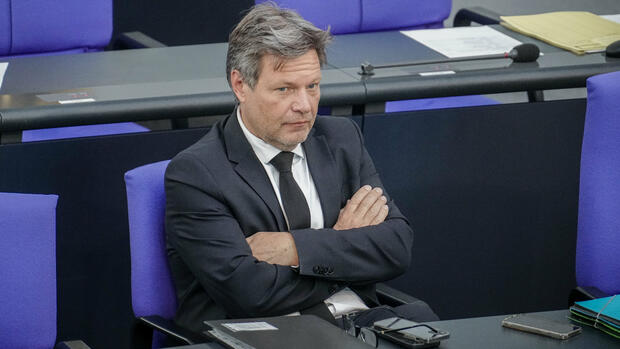Berlin The calls for a later start date for the new Building Energy Act (GEG) are increasing. The bureaucracy guards of the Regulatory Control Council (NKR) of the federal government are now advising to wait before passing it: The “doubts about the practicability of the regulations” expressed in many comments on the draft law should lead to “the entry into force of the law being postponed or significantly to anchor longer transition periods,” says the as yet unpublished statement of the committee on the GEG draft. The statement is available to the Handelsblatt.
The draft law, which Economics Minister Robert Habeck (Greens) and Building Minister Klara Geywitz (SPD) pushed through the cabinet in April, stipulates that from 2024 every newly installed heating system should be operated with 65 percent renewable energy. In many cases, this condition can only be met with an electric heat pump. The demand for the devices has already risen sharply.
The Bundestag will discuss the draft for the first time at the end of May, and a final decision should be made in June. According to previous planning, the law would come into force on January 1, 2024.
The NKR considers it “not impossible that a large, especially short-term, increase in demand will lead to bottlenecks and thus to additional cost increases, at least temporarily”. In addition, there would be further costs for necessary accompanying measures on buildings, such as the insulation of the building envelope, which “so far have largely been disregarded and not shown in the draft law”. The NKR is an independent control and advisory body of the federal government that is supposed to check laws and regulations for bureaucratic consequences.
Stadtwerke: So far, the debate has been too focused on the heat pump
The energy industry also considers the start of 2024 to be premature. For example, the Association of Municipal Companies (VKU), in which the municipal utilities are combined, calls for the GEG and municipal heat planning to be better coordinated. “The GEG and the municipal heat planning must fit together,” said VKU general manager Ingbert Liebing of the Handelsblatt. “We should give ourselves six months for carefully coordinated regulations. That creates clarity and trust.”
Above all, the funding modalities for heating networks should be made clearer. The federal funding for efficient heating networks (BEW), which is endowed with three billion euros until 2026, can only be a start, according to Liebing.
Municipal heat planning obliges cities and communities to develop concepts for local heat supply. Heating networks play an important role in this. This opens up an additional opportunity for owners whose house is located in the catchment area of existing or future heating networks to convert the heat supply to renewable energies.
The legislator assumes that heating networks will gradually deliver climate-neutral heat on the basis of existing specifications and incentives. House owners can thus delegate the conversion to heating with renewable energies to the operator of the heating network and save themselves the investment in a heat pump.
Whether and where new heating networks will be built in the coming years is to be determined from municipal heating planning. Although Baden-Württemberg, for example, has already advanced municipal heating planning, most other federal states still have nothing to show for it. In their coalition agreement, the traffic light coalition partners have agreed to create the framework for nationwide heat planning.
Habeck does not fundamentally reject postponement
Liebing advises giving the heating networks a higher priority. “By 2035, we will need three billion euros per year to expand heating networks. If the funding is reasonable, it also reduces the costs for a district heating connection for each individual end customer,” said Liebing. The discussion of the past few weeks has been “fixated far too strongly on electric heat pumps”. The Federal Association of Energy and Water Management (BDEW) also warns against hasty determinations in the GEG and urges close coordination with heat planning.
>> Read here: Debate about the start of the heating law – is the postponement coming?
The topic is still controversial in the traffic light coalition. However, even Economics Minister Habeck had recently no longer ruled out a postponement. The coalition committee decided in favor of 2024.
With a view to the parliamentary deliberations in the Bundestag, however, he said that it was “of course just as relevant to think about whether you start later or start a little later”. In this regard, he was “maximally pragmatic”.
The FDP parliamentary group does not want to negotiate the law until its list of questions has been answered.
(Photo: imago/Metodi Popow)
Meanwhile, the FDP parliamentary group in the Bundestag apparently still sees numerous open points in the draft law. As the “Bild” reports, the parliamentary group has created a questionnaire with 101 questions for Habeck and wants to hand it over officially shortly. The liberals insist on detailed answers before deliberations on the law, the newspaper writes – and quotes FDP economic politician Frank Schäffler: “The current draft is a disaster.”
More: Did medium-sized companies oversleep the heat transition?
